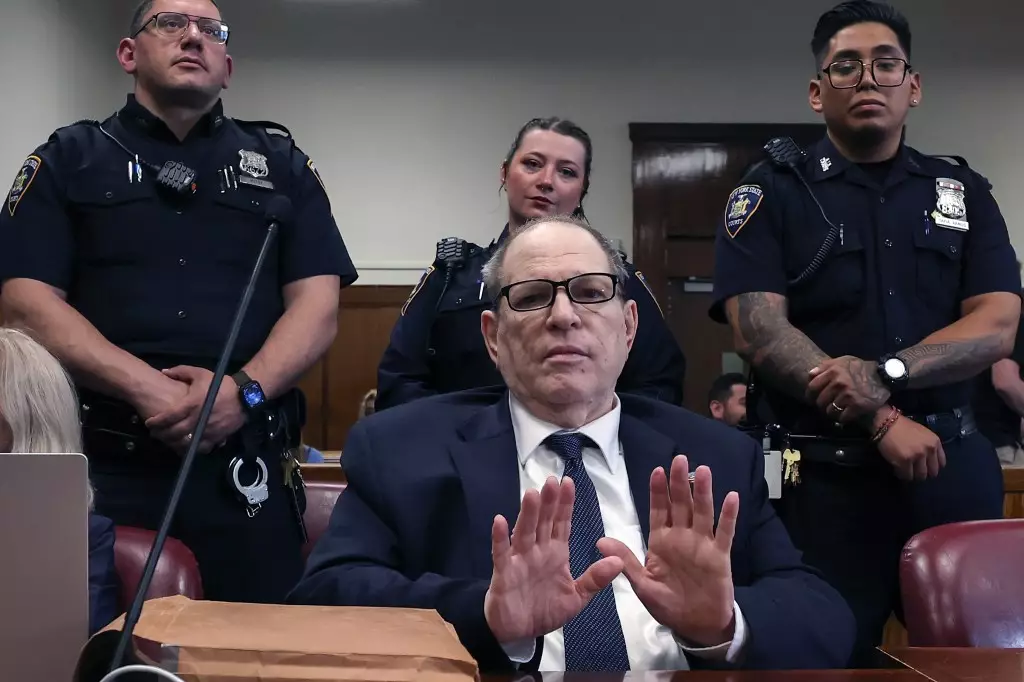The Harvey Weinstein trial is nothing short of a grotesque theater, exacerbating the nation’s ongoing struggle to reconcile celebrity culture with the reality of justice. Weinstein’s decision not to testify in his recent New York rape retrial has sparked conversations not just about his individual case, but about the very fabric of accountability within high-profile scandals. As he opts to remain silent under the legal tentacles of his defense team, one can’t help but feel that this is a calculated move, a way to minimize further damage to an already tarnished reputation rather than a genuine defense of innocence.
His spokesperson, Juda Engelmayer, insists their decision stems from caution rather than evasion. But let’s be real: it feels more like a strategic retreat in a battle that has been riddled with public and media scrutiny. When legal representatives cast a pall over the necessity of momentous testimony, it raises unsettling questions about how the legal system can be manipulated by those with deep pockets and resources to assume the moral high ground.
The Machinery of Manipulation
Weinstein’s dragging saga reminds us how the machinery of manipulation often shields the powerful from accountability. He continues a silent war through public relations tactics, framing himself as a perpetual victim of wrongful accusation. In interviews, he leans into a well-orchestrated rhetoric claiming, “I swear that before God… I’m wrongfully accused.” Such statements serve a dual purpose: they garner sympathy while simultaneously discrediting the voices of his accusers. This is a dangerous game and one that reflects a worrying trend in modern society—the valorization of the accused over the marginalized voices that demand justice.
This strategy exploits the evolving social landscape since the emergence of the #MeToo movement, an era that saw many come forward with their stories of abuse. Now, Weinstein’s defense attorney, Arthur Aidala, attempts to twist these narratives, labeling the encounters as “friends with benefits” agreements. This reduction of complex realities to banal and disingenuous terminology showcases an unnerving lack of regard for the gravity of such allegations.
The Political Undertones
As we peel back the layers of Weinstein’s tumultuous saga, the political undertones cannot be ignored. The judicial landscape seems marred by not merely personal culpability, but also by the intersection of power and privilege. New York City, where wealth can sometimes substitute for justice, now features a new judge, hinting at a manipulation of the legal system that raises the concerned eyebrows of many.
Political affiliations never seem far behind when discussing high-profile cases. The alliances formed in legal proceedings suggest a broader narrative where power is wielded almost like a sword to incite fear into potential adversaries. With Weinstein’s PR campaign employing figures like Candace Owens, a polarizing personality known for her right-leaning affiliations, the narrative morphs into one of “us versus them,” further entrenching divisions within the public sphere.
Implications for Society
As jury deliberations draw near, the implications of this trial carry weight far beyond the courtroom; they ripple through societal norms and ethics. We find ourselves at a critical juncture where conversations surrounding consent, accountability, and justice are reshaping our cultural climate. Yet, with every murky twist in Weinstein’s case, the institution appears to favor those who masquerade behind a veil of plausible deniability.
In this age of heightened awareness, the importance placed on the voices of survivors must remain paramount; challenging the “win at all costs” mentality that often pervades legal circumstances is crucial. Questions about equity and representation in the courtroom echo loudly as society watches this latest episode unfold.
In the end, this trial isn’t just about Harvey Weinstein; it’s an examination of our societal willingness to unmask the ghosts that have long haunted our cultural fabric—ghosts that demand accountability and justice. As the world awaits the jury’s decision, one can only hope that true justice prevails, and that the powerful are reminded that they are not above the law.

